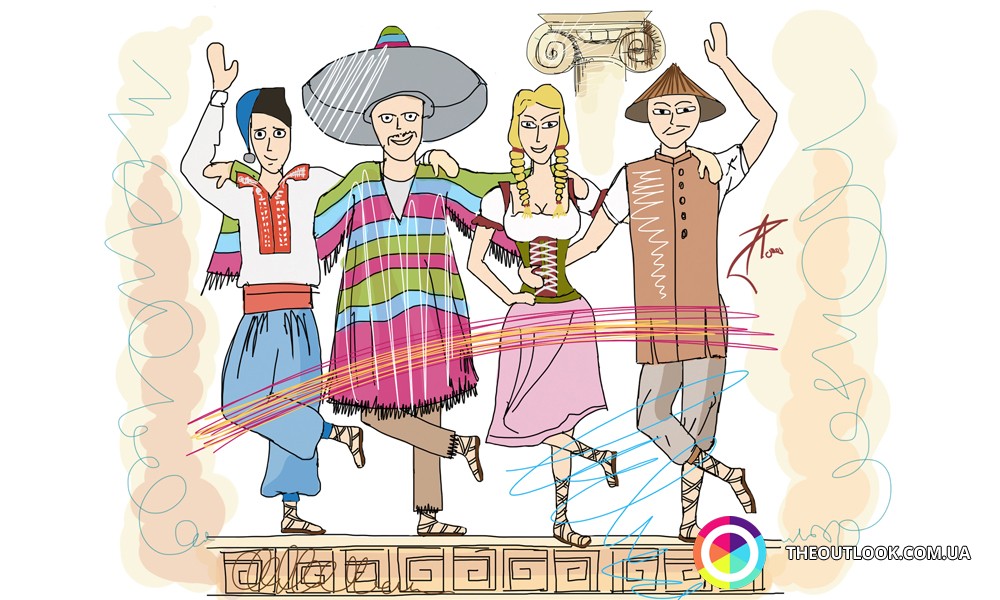Mentality bank

There was boxing demonstrated
on television of Leningrad. Negro,
black as coal, was fighting a white-haired
Pole. Narrator explained:
- You can tell Negritic boxer by light-blue edges of his trousers…
Sergei Dovlatov
“Solo on Underwood. Solo on IBM”
The notorious joke about the boxer and trousers edge spread around the world (its capable of reading part, at least) as far back as in 1980 the moment “Solo on Underwood” was published in New York. Political correctness with elements of sarcasm. Then again, back in the times as well as nowadays, attempts to erase national and mental differences are an attribute of allegedly good manners. But it is in this abundance of world mentality bank stocks where the whole point, gist, gusto and charm lie! Outlook suggest you see for yourself how wonderfully different we all are.
Let's fancy ourselves on an international bus. The vehicle is full and people keep getting in and out so our place and respectively neighbors change all the time. Should we happen to sit by an American, in a couple of minutes we are almost sure to get a friendly smack on a shoulder and hear good-natured “Now, how do you like America?” This kind of “backslapping” is in their blood. Sociologists and culture studies experts believe that for citizens of the USA relations of choice are superficial acquaintances. Therefore it is very much possible that an accidental “neighbor” will share his intimate life details, the only thing is that he won’t even remember our names after saying goodbye.
Fine, an American goes, an Englishman takes his place. It is probably due to the use of the same (fairly) language, but stereotype makes Brits be perceived very much like “Yankees”. It is a huge mistake: with 95% probability a new neighbor won’t talk to you at all and 99% that he won’t touch you. According to outcomes of a special research, physical contact – a touch, a hug, a handshake – is connected directly to nation. Within an hour of communication Puerto-Ricans touched each other 180 times, Frenchmen – 110 times while Englishmen – not even once. Such reticence and morose manner aren’t merely a common event for the citizens of the kingdom. No, it is already in their blood. In order not to talk about uneasy or personal issues, they even came up with special phraseological withdrawals: interlocutors do not finish them – everything is clear anyway. For instance “ill winds” (blow nobody good) or “this ain’t no shower” (it’s a downpour). When something of the kind is said, the tone matters because it is it that reveals a person’s willingness to continue the talk.

Enough of the bus, let’s get off it. A Japanese is coming towards us. After an American’s backslapping we wink at him asking “How are you doing?” He answers with a smile: “Everything is fine, coming from my daughter’s funeral”. You shouldn’t think that an inhabitant of the Land of the Rising Sun is joking. Most likely, he did lose a child. His smile is a kind of a shield, a message that he is going to deal with his grief by himself and he doesn’t need anybody’s help. We walk another 10 meters to meet a Russian and ask once again the how-are-you question. Even if his daughter didn’t die, descendant of Peter the Great will either petulantly grumble something in a low voice, or look at you gloomily. It’s just that it isn’t customary in Russia to laugh without a reason. At that, there is always something to complain about.
We are hungry so we drop by the first café on our way that is filled with people of various nationalities. Frenchmen are to our left. They are rather arrogant and swear for no particular reason. When heaping unprintable words and phrases on each other they are merely… arguing. Napoleon’s descendants have a very short memory so don’t be surprised if one day you have a scrap with them and the next one they’ll invite you for a glass of red, as if nothing had happened.
Englishmen sitting nearby behave much differently. Attempting not to make to much fuss, they will most likely remain expressly polite and smiling and later will simply place you into their own black list should your behavior seem a slightest bet wrong from their point of view.
Japanese table is one of the noisiest. And it isn’t about conversation at all. Simply food in our café is very delicious and in order to show it the Japanese chew and smack with relish. Not only do they do it at home but also in public places. Among them it isn’t customary to verbally praise a chef – it is much more important to eat “loudly”. The Chinese are on the same page with them about it. Multiple belching of guests is the best compliment for the mistress.

When back from hypothetical situations to the real world do not forget that even same gestures are read in a different way in every place. For instance, raised eyebrows mean surprise in Russia, amazement in Germany and show of skepticism in the UK. “Okay” composed of thumb and index finger means “good” in America. In Japan it represents money while in Portugal and Brazil such gesticulation is considered indecent. When communicating with an Englishman or a Spaniard, don’t be surprised when they whack their forehead. It is their way of publicly showing that they are content with themselves. In Germany they show indignation towards an interlocutor with this move.
As we can see, differences are evident in almost everything. There are thousands of them and they all won’t fit a single guide book or sound advice collection…
Illustration by Aleksandr Zadneprianii





















